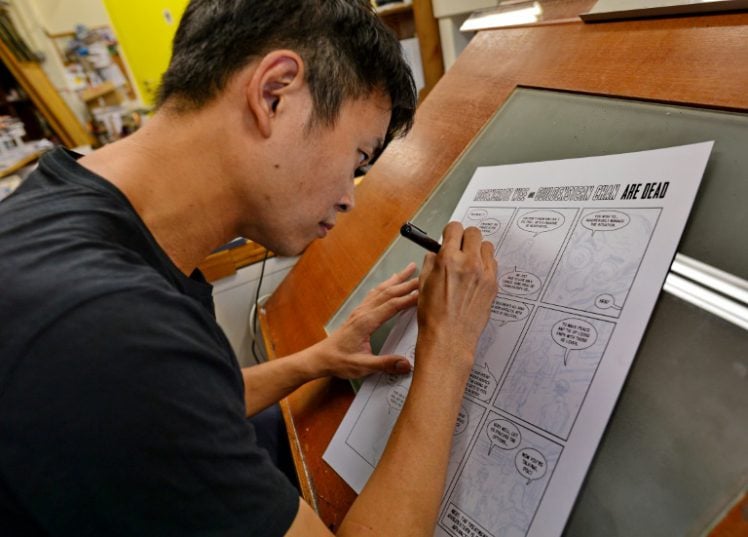Singapore cartoonist Sonny Liew swept the comic industry's "Oscars" and is a hit at home, but the city-state has struggled with how to respond to his surprise best seller, which challenges its own carefully-scripted version of history.

With a cast of aliens and robots and a mish-mash of influences, Liew’s graphic novel “The Art of Charlie Chan Hock Chye” appears at first glance more of a paean to history’s greatest comic book artists than a subversive tome.
But the story — which retells Singapore’s story from the 1950s to the present through the eyes of a fictional cartoonist — questions the official narrative hammered into citizens of the tightly-controlled city-state from a young age.
A central character is a real-life figure, Lim Chin Siong, a popular left-wing trade union leader who was a rival to Singapore’s authoritarian founding father Lee Kuan Yew in the ’60s, and who was jailed during Lee’s rule.
Lim plays little part in official histories of that tumultuous period when Singapore became independent from British rule, an era marked by protests and riots, but the book presents an alternative vision of the past in which the late politician becomes premier.
On the other hand, Lee — the central figure in Singapore’s official histories and revered by many for transforming the city-state into one of the world’s richest societies — is presented in an unflattering light, as a hardline ruler who brooked no criticism.
“I was trying to present history the way it really is: full of richness and complexities,” Liew told AFP.
“I wanted to show that there are different versions of history. It’s less about which is the most true or accurate, but rather for the reader to come away with an understanding that they need to approach all historical texts with a critical eye,” the 42-year-old added.
– Causing alarm –
In Singapore, where media is tightly controlled and government critics have been hit with financially ruinous lawsuits, the book initially caused alarm.

Liew has been allowed to continue his work from his studio stuffed full of pop culture memorabilia — he also writes and illustrates for DC Comics — is still invited to government-funded talks, and gets the use of a subsidised workspace
On the eve of its launch, government agency the National Arts Council (NAC) withdrew an Sg$8,000 ($5,900) grant given to Liew for the book — whose previous works did not touch on Singapore’s history — due to its “sensitive content”.
An official from the agency said the work “potentially undermines the authority of legitimacy of the Government and its public institutions”.
But the move backfired. The extra attention caused by withdrawing the grant helped turn the graphic novel into a hit, and it is now in its fifth print run and has been translated into four languages.
In July, Liew won three Eisner Awards, regarded as the Oscars of the comic industry, at Comic Con International in San Diego for the graphic novel, including one for Best Writer/Artist.
The arts council did issue a terse, congratulatory statement — but did not go so far as to mention the name of the book.
“With the NAC, they’ve told me explicitly that they had to draw a line between me as an artist, which they support, and my book, which they said they can’t get behind,” Liew said.
Highlighting his awkward position, Liew last week said he will be returning a NAC grant of Sg$19,000 for a new book he is working on in a bid to avoid “the comprises” involved in a relationship with the authorities.
– Sensitive ground –
Overall, the official reaction has been relatively muted.
Liew has been allowed to continue his work from his studio stuffed full of pop culture memorabilia — he also writes and illustrates for DC Comics — is still invited to government-funded talks, and gets the use of a subsidised workspace.
Some observers see in the mild response a further sign that authorities may be relaxing their tight control over society.
Authorities had already lifted long-standing bans on 240 books and magazines in 2015. However others believe they may be simply accepting reality — that it would be counterproductive to try to ban such a popular work.
Singapore has had the same ruling party, The People’s Action Party, since 1959, a few years before it became independent from Britain, while Lee Kuan Yew was prime minister for over three decades, and his son is the current premier.
Lee, who died in 2015, was undoubtedly one of the commanding figures of Asia’s post-war economic rise, but faced criticism for his iron-fisted rule, forcing several opposition politicians into bankruptcy or exile.
Liew is fully aware that he is treading on sensitive ground and said he had made sure to rigorously check all the facts in his work.
“I do realise this is Singapore so I’m very careful,” he said, with a knowing smile.
Support Local Journalism
Add The Citizen as a Preferred Source on Google and follow us on Google News to see more of our trusted reporting in Google News and Top Stories.






